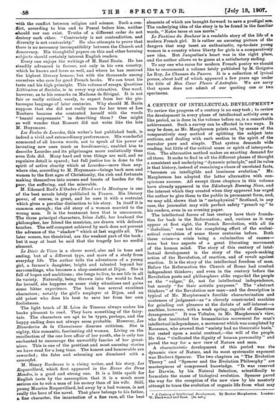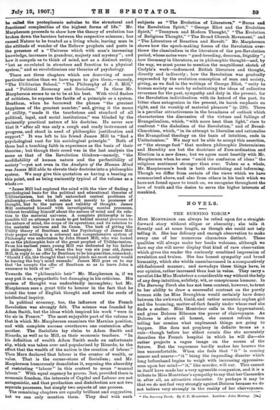A CENTURY OF INTELLECTUAL DEVELOPMENT.• To review the progress of
a century is no easy task ; to review the development in every phase of intellectual activity over a like period, as is done in the volume before us, is a remarkable achievement. Such a survey can be effected in two ways. It may be done, as Mr. Macpherson points out, by means of the comparatively easy method of splitting the subject into sections, and dealing with each section in the spirit of the narrator pure and simple. That system demands wide reading, but little of the critical sense or spirit of interpreta- tion. The alternative method makes an exacting demand for all three. It seeks to find in all the different phases of thought a consistent and underlying " dynamic principle," and its value is that history, instead of remaining a chaos of unrelated facts, "becomes an intelligible and luminous evolution." Mr. Macpherson has adopted the latter alternative with con- spicuous success. All except three chapters in this volume have already appeared in the Edinburgh Evening News, and the interest which they created when they appeared has urged the author to give them to the public in permanent form, and, we may add, shows that in " metaphysical " Scotland, in any case, the journalist may with perfect safety "preach up" to his readers, even in an evening paper.
The intellectual forces of last century have their founda- tion far back in the Reformation; and, curious as it may appear at first sight, the French Revolution, with all its " diabolism," was but the completing effort of the ecclesi- astical convulsion of some three centuries before. Both these crises—a crisis being a culmination of causes— were but two aspects of a great liberating movement of the human mind. The story of this century of intel- lectual development is the story of the epoch-making action of the Revolution, of reaction, and of revolt against reaction. It is the story of the intellectual freedom of man. Before the Reformation the Church of Rome lied crushed independent thinkers; and even in the century before the Revolution poets and philosophers alike regarded the people as the " vulgar," fit, not for intellectual independence, but merely " for their artistic purposes." The " abstract thinkers " of the Revolution saw man—and the description is typical of Mr. Macpherson's forcible characterisation and acuteness of judgment—as "a cleverly constructed machine for grinding out pleasure at the dictate of self-interest—a machine, however, with a weak spring, capable of disastrous derangement." It was Voltaire, in Mr. Macpherson's view, who first instituted the humanitarian movement for man's intellectual independence, a movement which was completed by Rousseau, who avowed that "society had no theocratic basis," but rested upon a social contract,—tbe will of the people. He thus " vindicated the dignity of human personality " and paved the way for a new view of Nature and man.
A characteristic development of this period was the dynamic view of Nature, and its most systematic exponent was Herbert Spencer. The two chapters on " The Evolution Theory" and "Spencer and the Evolution Philosophy" are masterpieces of compressed knowledge. "It was reserved for Darwin, by his Natural Selection, scientifically to formulate the cause of biological evolution. Spencer paved the way for the reception of the new view by his masterly attempt to trace the evolution of organic life from what may
• A Century of Intellectual Development. By Hector Macpherson. London: W. Blackwood and Sons. [6s. net.„1
be called the protoplasmic nebulae to the structural and functional complexities of the highest forms of life." Mr. Macpherson proceeds to show how the theory of evolution has broken down the barriers between the respective sciences ; has caused Nature to be treated as a living whole, leaving man in
the attitude of wonder of the Hebrew prophets and poets in the presence of a " Universe which with man's increasing knowledge, increases in grandeur, majesty and mystery" ; and how it compels us to think of mind, not as a distinct entity, "but as co-related in structure and function to a physical system," and so revolutionises our theories of psychology. There are three chapters which are deserving of more particular notice than we have space to give them,—namely, "The Utilitarian School," " The Philosophy of J. S. Mill," and " Political Economy and Socialism." In these Mr. Macpherson seems to us to be at his best. With vivid flashes of criticism, be exposes the faults of a principle or a system. Bentham, when be borrowed the phrase "the greatest happiness of the greatest number," and, giving it the name of utility, " made it the touchstone and standard of all political, legal, and social institutions," was blinded by the eminently practical nature of his doctrine. He never saw that it " after all was only a rough and ready instrument of progress, and stood in need of philosophic justification and support." It was left to his friend James Mill to "find a psychological root for his sociological principle." Both of
them had a touching faith in experience as the basis of their theories ; but though their creed was in the last analysis the same as that of the Revolution thinkers—namely, " the modifiability of human nature and the perfectibility of society "—yet not even in the Analysis of the Human Mind was James Mill able to elevate their doctrine into a philosophic system. We may give this quotation as having a bearing on this point, and as being eminently typical of the volume as a whole :- "James Mill had explored the mind with the view of finding a psychological basis for the political and educational theories of Utilitarianism, but he left untouched central problems of philosophy,—those which relate not merely to processes of thought, but to the nature and validity of thought. James Mill contented himself with investigating mental processes, without troubling himself about the nature of mind and its rela- tion to the material universe. A complete philosophy is im- possible till an attempt is made to get behind mental processes to tho nature of mind, the scope of its operations, and its relation to the material universe and its Cause. The task of giving the Utility theory of Bentham and the Psychology of James Mill their proper setting in a coherent and comprehensive system of Philosophy was undertaken by John Stuart Mill, who was looked on as the philosophic heir of the great prophet of Utilitarianism. From his earliest years, young Mill was dedicated by his father to philosophy. In 1812, when the boy was six year old, James Mill, in reply to an offer by Bentham to be his guardian, remarked : Should I die, the thought that would pinch me most sorely would be leaving the boy's mind unmade.' James Mill goes on to say that he accepts the offer of Bentham so as to leave John a successor to both of us.'" Towards the "philosophic heir" Mr. Macpherson is, if we may put it so, sympathetic but damaging in his criticism. His system of thought was undoubtedly incomplete; but Mr. Macpherson sees a great title to honour in the fact that he raised the tone of English thought and sowed the seeds of intellectual inquiry.
In political economy, too, the influence of the French Revolution was strongly felt. The science was founded by Adam Smith, but the ideas which inspired his work " were in the air in France." The most enjoyable part of the volume is that in which Mr. Macpherson examines the Marxian position, and with complete success overthrows one contention after another. The Socialists lay claim to Adam Smith and Ricardo, as well as to Mill, as their economic teachers. " In his definition of wealth Adam Smith made an unfortunate slip, which was taken over and popularised by Ricardo, to the
effect that the wealth of the nation is the creation of labour." Then Marx declared that labour is the creator of wealth, or value. That is the corner-stone of Socialism ; and Mr. Macpherson humorously demolishes it, exposing the absurdity of restricting " labour " in this context to mean " manual labour." With equal cogency he proven `•hat, provided there is economic freedom, the interests of Capital and Labour are not antagonistic, and that production and distribution are not two
separate processes, but simply two aspects of one process.
The remaining chapters are equally brilliant and suggestive,
but we can only mention them. They deal with such
subjects as "The Evolution of Literature," "Burns and the Revolution Spirit," " George Eliot and the Evolution Spirit," " Tennyson and Modern Thought," " The Evolution of Religious Thought," " The Broad Church Movement," and " The Literature of Reaction and Revolt." Mr. Macpherson shows how the epoch-making forces of the Revolution over- threw the classicalism in the literature of the pre-Revolution period, whose notes were " good-breeding, decorum, frigidity " ; how Germany in literature, as in philosophic thought—and, by the way, we must pause to mention the magnificent sketch of Carlyle's work—influenced British literature and thought, directly and indirectly ; bow the Revolution was gradually superseded by the evolution conception of man and society, giving, as we find in the writings of George Eliot, " unity to human society as such by substituting the ideas of collective reverence for the past, sympathy and duty in the present, for the Revolution individualism with its hatred of the past, its bitter class antagonism in the present, its harsh emphasis on right, and its worship of material pleasure " (p. 228). There is a peculiar attractiveness in the broadness of outlook which characterises the discussion of the virtues and failings of Evangelicalism, which, "with more heat than light," rises to confront " the diabolism of the Revolution," and of Broad- Churchism, which, " in its attempt to liberalise and rationalise the Evangelical theology on the basis of intuition, ends in Unitarianism." We may not be able to accept this assertion, or " the strange fact " that modern philosophic Determinism and Heredity are but the doctrines of Fore-ordination and Election in a new dress; but we agree most heartily with Mr. Macpherson when he sees "amid the confusion of ideas" the religious sentiment stronger than ever. Taken as a whole, Mr. Macpherson's book is both stimulating and informing. Though we differ from certain of the views which we have summarised above, and also from others in his book which we have not found space to touch on, we recognise throughout the love of truth and the desire to serve the higher interests of mankind.







































 Previous page
Previous page